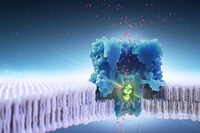Next steps for nanopore technology
The actors of the nanodiag BW future cluster have just received approval notices from the Federal Ministry of Education and Research (BMBF) totalling almost 15 million euros. This means that the multidisciplinary innovation network led by Hahn-Schickard (cluster spokesperson is apl. Prof. Dr. Felix von Stetten) and the University of Freiburg (deputy cluster spokesperson is Prof. Dr. Jan C. Behrends) can begin its first three-year implementation phase. With the help of nanopore technologies, epigenetic factors influencing diseases are to be detected and innovative products and services brought into use.
The "Bionanopore Analyser" project aims to develop a novel platform for analysing epigenetic mechanisms that will make a decisive contribution to medical diagnostics and prognostics of the future. To this end, the cluster brings together basic research in biophysics, electrophysiology, epigenetics, structural biology, bioinformatics and artificial intelligence (AI) with innovative microelectronics, microfluidics and bioanalytical sample preparation in the application focus of the analysis of protein modifications, especially for epigenetic tumour therapy. The project is led by Prof. Dr. Jan C. Behrends from the Physiological Institute of the University of Freiburg together with Dr. Gerhard Baaken from Ionera GmbH. It is funded with approx. 5.4 million euros.
The overall goal of the "Solid State Nanopore Analyser" project is the industrial manufacturability of robust and flexible single molecule sensors. In doing so, it will be possible both to "recreate" the geometry and properties of naturally occurring nanopores in a "biomimetic" approach using high-end technologies and to systematically and specifically scale up this functionality. Materials science, micromechanics, nanostructuring and microelectronics contribute to this, as does AI-based data analysis. Thus, for the first time, the technological basis for practical point-of-care diagnostic applications of next-generation single-molecule detection is being created. The project is coordinated by Prof. Dr. Alfons Dehé from Hahn-Schickard together with Dr. Franz Lärmer from the Robert Bosch Research Centre in Renningen. It is funded with approx. 5.4 million euros.
The aim of the project "Digital Nanopore Sequencer and Marker" is to prepare the basis for the use of nanopore technology in the clinic. To this end, a so-called "Interactome Profiler" is being developed, which provides information about molecular interactions. Through a highly parallel arrangement of thousands of nanopores and a digital readout, the influence of disease-associated epigenetic factors such as methylation of DNA and the post-translational modifications of proteins will be quantified. In particular, novel epigenetic biomarkers for predicting patient response to immunological and epigenetic therapy in laryngeal and gastrointestinal tumours will be determined and evaluated for subsequent nanopore-based liquid biopsy diagnostics. The project is led by Professor Irina Nazarenko from the University Medical Centre Freiburg together with Dr. Peter Koltay from Actome GmbH. It is being funded with approximately 2.7 million euros.
In the fourth project, the innovation-supporting measures funded by the BMBF are organised for all partners of the cluster. These include updating the cluster strategy, providing analyses (competition, markets, IP landscape, etc.), sustainable competence and resource building, increasing the innovative capacity of the cluster actors, e.g. by implementing an open innovation culture, and supporting the formation of value chains and start-ups from the cluster environment. Cluster manager Dr Stephan Karmann is leading the project together with von Stetten. It is funded with about 1.5 million euros.
In addition to the federal government, the state of Baden-Württemberg is the second major provider of third-party funding for the Future Cluster. Both the Ministry of Economics and the Ministry of Science have already approved funding for accompanying measures in the six-figure range for 2023.
Link to original press release: https://www.hahn-schickard.de/en/news-detail/next-steps-for-nanopore-technology
Contact:
Katrin Grötzinger
Public Relations Hahn-Schickard
Phone: +49 761 203-73242
E-Mail: Katrin.Groetzinger@Hahn-Schickard.de
Kerstin Steiger-Merx
Representative PR/Marketing
Faculty of Engineering
Phone.: +49 761/203-8056
E-Mail: steiger-merx@tf.uni-freiburg.de

